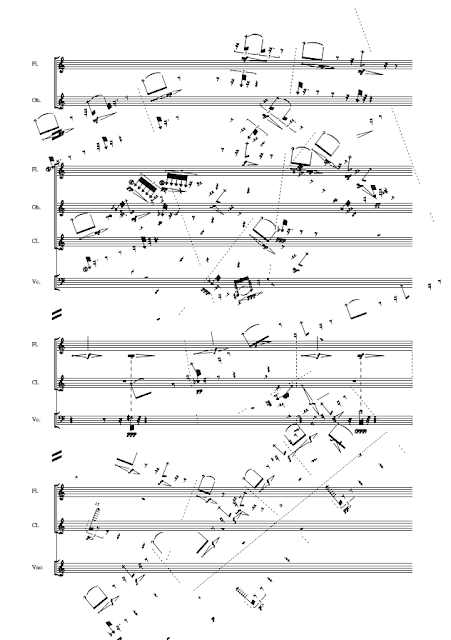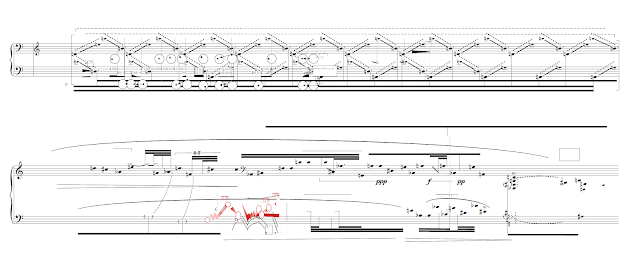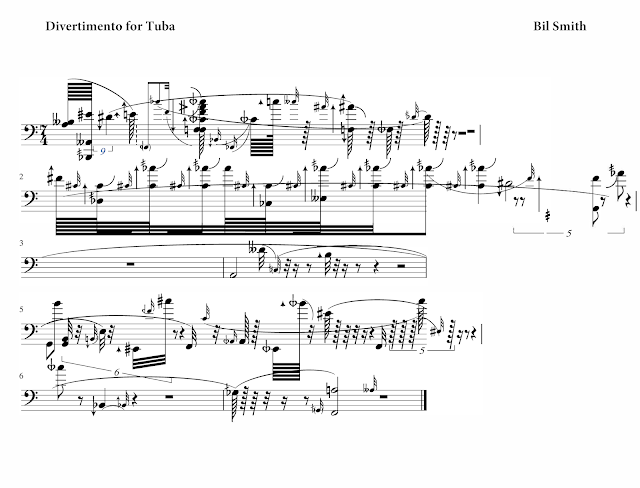Saturday, December 12, 2020
Monday, November 30, 2020
"Everlest" for Pocket Flugelhorn. A Circos Tablature System.
Sunday, November 29, 2020
Sunday, November 22, 2020
"Modulus That Could Be Multiplied By A Lump Sum"
"Modulus That Could Be Multiplied By A Lump Sum"
Bil Smith Composer
Zirnbauer Piccolo Trumpet, Cello, Truncated C Flute, Alto Flute, Roman Tuba, Lelo INA 2, Slide Trumpet, Small Chamber Orchestra with Tendency Masks, Stochastic Masking and Dense Trainlet Clouds.
Recorded at MSR Studios, New York, NY on April 9, 2013.
On SoundCloud:
Saturday, November 21, 2020
Recording: "The Assumptions of the Propulsion Phase" (Compaction Music)
"The Assumptions of the Propulsion Phase" (Compaction Music) - Bil Smith Composer
for Paramorphic Vibraphone, Rectocele Pocket Trumpet, Inderbinen Basstrompete Basso, LP Cajon Castanets, High Pitch; Chromium Gravitic Wood Flute and Dewanatron Swarmatron.
Listen on SoundCloud:
Wednesday, November 11, 2020
Monday, October 19, 2020
"Lexical" for Orchestra
"Lexical"
for Orchestra
Solo Violin, Viola, Cello and Density Coded Magnetic Optic Tape.
(2006-2013)
Bil Smith, Composer
Premiere Live Performance.
Listen on SoundCloud:
Thursday, October 15, 2020
Tuesday, October 13, 2020
Saturday, August 29, 2020
Sunday, August 16, 2020
"Identical Indented Comments" for Contrabassoon and Soprano Saxophone
"Identical Indented Comments"
for Contrabassoon and Soprano Saxophone
Bil Smith Composer
A new musical tablature attempting to base a workable theory of aural syntax on concrete tokens.
I have a suggestion to expand the scope of experimental tablatures. Philosophers use a range of tools. To mention just a few, these include logic, probability, game theory, economic modeling as well as computer simulations.
What if, as enlightened composers, we begin using the tools of cognitive science and experimental psychology to examine philosophical music questions. My suggestion with this composition, and moving forward, is to add data science to the catalogue of compositional tools.
-Bil Smith
Sunday, August 9, 2020
Friday, July 17, 2020
"Salicus" for Flute and Violin
The potential of big data is immense. Eliminate constraints on the size, type, source and complexity of relevant data, and composers can ask bolder questions. Technology limitations that once required sampling or relied on assumptions to simplify high-density data sets have fallen to the march of technology.
Sunday, July 12, 2020
Saturday, July 11, 2020
Saturday, July 4, 2020
Wednesday, July 1, 2020
Sunday, June 21, 2020
Saturday, June 20, 2020
Friday, May 15, 2020
Sunday, May 10, 2020
Wednesday, May 6, 2020
Tuesday, May 5, 2020
Sunday, May 3, 2020
Monday, April 27, 2020
Sunday, April 26, 2020
Saturday, April 25, 2020
Saturday, April 18, 2020
'Diego Garcia' for Solo Electric Guitar (for The Royal Economic Commission)
'Diego Garcia' for Solo Electric Guitar (for The Royal Economic Commission).
Inaugural Performance: Temple of Fine Arts, Lebuhraya Babington, Penang, Malaysia in conjunction with Malaysian Philharmonic Orchestra (MPO) and Laboratorie NewMusic.
August 3, 2014
Missing Malaysia Airlines flight MH370 may have flown into tiny island called Diego Garcia. Diego Garcia is a remotely located atoll in the Indian Ocean. The lonely island in the middle of the Indian Ocean is home to a U.S. Naval base and is now speculated to have answers to the MH370 mystery.
Propagators of this theory believe that the little island maybe the actual location where MH370 landed after being hijacked and can now be found in. The island is said to be "one of the world's most remote locations," which allegedly has a "secret prison." The island reportedly has no indigenous inhabitants as they were forcibly removed and were asked to relocate on other locations such as Chagos Archipelago, Seychelles and Mauritius in the year 1971.
Diego Garcia is located 4700 km northwest of Australia and has 1700 military personnel and 1500 civilian contractors residing there.
The lonely island reportedly has a runway that can accommodate a plane as big as Boeing 777. Therefore, Diego Garcia is now considered to be the potential location where missing Malaysia Airlines flight MH370 can be found, according to a theory.
The theory became the subject of speculation when it was figured that MH370's pilot Captain Zaharie Shah's flight simulator had Diego Garcia's runway location stored in it. Earlier, the FBI reported that there was "nothing sinister" about the homemade flight simulator and files stored in it. But reports claiming that the plane was "deliberately" taken off the radar detection have drawn attention towards the pilot of MH370 yet again.
Furthermore, an American freelance journalist Jim Stone is advocating the theory that claims MH370 may have landed in Diego Garcia island.
The blogger claims that Philip Wood, an American passenger traveling in the now missing flight MH370, did manage to send a message. The text contained information including GPS coordinates that presented a location that is just few kilometers away from the Indian Ocean island Diego Garcia. The text revealed that Philip Wood has been held hostage by some unknown military personnel.
MH370 passenger Philip Wood is said to be an IBM engineer. The Examiner further explains Jim Stone's Diego Garcia conspiracy theory. The theory states that the intention behind taking the plane is concerning 20 top employees of Freescale Semiconductor Inc. on the flight.
These people reportedly worked on the development of semiconductor and were soon going to get it patented. But if rest of the people who worked on the project are gone, the patent can be owned by one person named Jacob Rothschild. Another reason behind the plane's disappearance could be that "some government wanted to get their hands on the knowledge held by the 20 top employees to have this microchip built for some reason," as per the report.
Thursday, April 16, 2020
Temblors Rising From Under The Pool. For Ensemble
Temblors Rising From Under The Pool
For Ensemble
Bil Smith Composer
2016
Recognizing how numerous experiments have demonstrated that notational systems have the ability to bond tightly, this work grafts idiomatic passages together so that different themes and registers are spliced in a sort of intellectual surrealism.
Subscribe to:
Posts (Atom)


















































